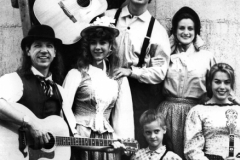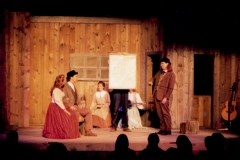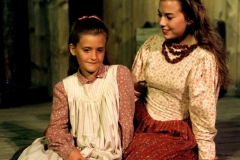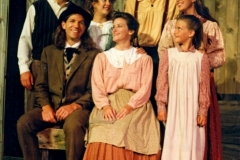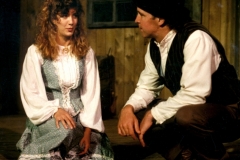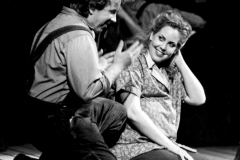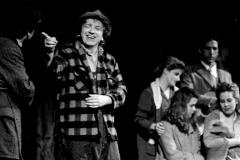Book and Lyrics by Fred Alley
Music by James Kaplan
Northern Lights tells the story of the stumpland farmers of northern Wisconsin, who came to the region expecting rich farmland and were instead greeted with a land of stumps and stones. The cast of characters includes William, a young transplant to the area, and his sister, Ginny, unmarried and pregnant; Eloise, a hardened farm wife, her estranged husband, Clayton, a land salesman, and their daughter, Lizzie; and Cody, the local guide and raconteur who falls in love with Ginny. Beautiful music and straightforward narration combine to render Northern Lights one of AFT’s most charming and poignant productions. (3W, 3M) Produced in 1993 & 1997.
Door County Advocate
MIKE SHAW - July 1993
Hopes of pioneer Badgers shine in “Northern Lights”
The lives of northern Wisconsin’s early settlers were marked by both harsh conditions and simple pleasures, backbreaking work and the joy of a rural joke.
To travel back to that period of pain mixed with hope, catch the American Folklore Theatre’s folk musical comedy “Northern Lights,” the Tuesday-Thursday-Saturday show playing at the AFT’s outdoor stage at Peninsula State Park.
The title refers to the breathtaking, colorful canopy that came over the northern night sky when the settlers put down their tools at the end of another long day.
The original play, written by Fred Alley and imaginatively directed by cast member Jeff Herbst, accurately captures both the frustration and die-hard spirit of the farmers whose search for a better lot brought them to the “stumplands” of turn-of-the-century Wisconsin.
The stumps, the last remains of the great northern forest, dotted a landscape whose crop-growing potential had been greatly exaggerated to the pioneers of Wisconsin’s final frontier. (It’s easy to imagine the setting in the peaceful isolation of the Peninsula Park forest.)
“Northern Lights” uses words, songs, jokes and homespun philosophy (“All good work comes to something good,” one character says) to relate the triumphs and tribulations of six stumpland settlers.
Cody the narrator (Herbst) best sums up the simple meaning of meaning when you’re struggling just to survive: “Hope is planting a garden, buying a new hat, building a cabin, falling in love.”
Eloise (Suzanne Graff) toils tirelessly and with quiet dignity to build a life for herself after being estranged from her huckster husband, land agent Clayton (played by AFT producer Dr. Fred Heide).
Consummate gentlemen farmers Cody and Willie (Alley) find time between the chores to fancy two pretty stumpland women: Eloise’s daughter Lizzie (Karen Mal, back for her second summer with the AFT); and Willie’s sister Ginny (newcomer Kelly Brainard). Ginny is trying to escape the whispers of scandal that accompanied a pregnant, unwed woman in the late 19th century.
Graff, a New York actress, last appeared with AFT two years ago in “Tongue ‘N Cheek” and “Moon of the Long Nights.” Brainard, who lends yet another striking voice to the AFT chorus, just completed her final year in the MFA acting program at Rutgers University.
A charming addition to the AFT cast is 7-year-old Rachel Sowinski of Fish Creek, who appears briefly as the little bundle of joy born to Ginny. Rachel, who landed the role after befriending Karen Mal last summer, seemed perfectly comfortable among her AFT pals. She spoke crisply and clearly and was undeniably cute to boot.
Under Herbst’s direction, the approximately 75 minutes of the show move quickly and enjoyably. He avoids any choppy feel to the play by eliminating stage exits and keeping all seven characters in front of the audience throughout.
The players who aren’t prominently featured at a given moment step into the shadows or remain frozen in movement and expression. Occasionally, an “off-stage” character offers a tidbit of wisdom from the wings, like the chorus in a Greek tragedy.
This seamless ensemble technique allows Herbst and Alley to tell the story in different ways than the traditional Act 1, Scene 1. Instead, the show is filled with flashbacks, simultaneous scenes involving two sets of characters and short, snappy vignettes. The approach keeps your eyes moving and the only interruptions, the songs, are welcome ones.
Composer James Kaplan, in his second collaboration with Alley, mines another treasure of music based on the folk songs of the period. The AFT’s trademark guitars set the musical moods for the show and Heide contributes a solo on a Native American flute during a critical late scene.
The cast moves in new directions musically as well, relying much more on harmonies and choruses. Of course, this could be considered a throwback to the days of the AFT’s predecessor, the Heritage Ensemble. But whatever your viewpoint, the AFT has found the right balance between the old and the new, between skilled musicians and professional actors.
One other note: Although like most AFT shows “Northern Lights” leaves you humming in your car on the drive home, all doesn’t end happily.
After all, the setting is a harsh environment and the history of homesteading tells us that not everyone successfully weathered the storms, poor soil and insects. Perhaps sensing that its audiences are growing more well rounded, the AFT takes a theatrical chance by injecting melancholy into what is essentially a happy and hopeful tale.
And as usual, the AFT prepares its audiences for the comedy to come through the tongue-in-cheek biographies of the performers in the program.
Green Bay Press-Gazette
WARREN GERDS - July 1993
“Folklore” charms Peninsula audience
FISH CREEK – American Folklore Theatre can take the unlikeliest topics—like “stump farming”—and turn them into delicacy-filled little musicals.
An evening treasure for visitors to Peninsula State Park, the troupe is in the midst of another busy summer of staging two original shows.
Northern Lights follows a familiar, appealing pattern—a foundation of Wisconsin history, splashes of music, spurts of comedy, strokes of warm feelings for nature and human nature.
American Folklore Theatre is a state of mind that starts with its setting: An amphiteater with tall trees shaping the outline of the stage. If there is such a thing as environmental theater, this is it.
You don’t go to American Folklore Theatre to be dazzled. You go to be charmed.
Northern Lights charms despite lacking an “oh-wow” topic.
The show is an account of turn-of-the-century settlers who were lured to northern Wisconsin by land deals. Such a deal: The land was loaded with stumps from a timber industry that ran rough-shod through the forests.
The settlers faced mighty struggles. By creating a story with fictional characters, the troupe paints a picture of what these people probably faced and felt.
Romance plays a strong role in Northern Lights. Some is heart-warming (between a settler and a single woman expecting a child by someone else), some pulls the heart strings (a relationship that doesn’t spark as well as a marriage with the fire gone out of it).
In song, it’s easy to be taken by Fred Alley’s sweet, pure voice, especially in the lyrical title song. (Alley also was the catalyst for this show). [sic]
You’d have to have a cold heart not to be swept into the hopeful If I Were a White Bird featuring Kelly Brainard.
For a burst of fun, there’s Mortgage Patter, a brilliant rapid-speech piece delivered with diabolical delight by Fred Heide as a slippery land agent.
In its 23rd season, American Folklore Theatre is not a secret. But fresh shows ensure each visit is one of another discovery.


